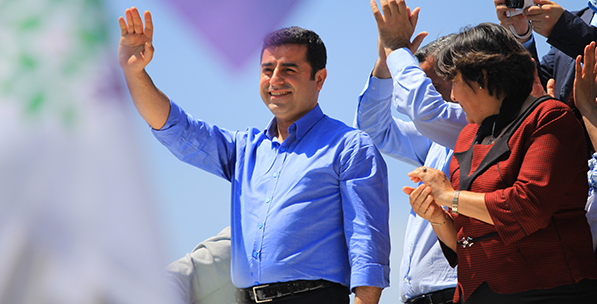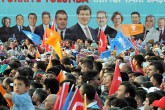With the 2015 parliamentary elections around the corner, the major political parties continue to fight over the small number of undecided voters. The economy and a potential transition to a presidential system represent the most prominent items on the agenda, but all eyes are fixed on the Peoples’ Democratic Party (HDP). After all, whether or not the party will manage to pass the 10 percent election threshold will have major implications for the country’s post-election political landscape and the future of the Kurdish reconciliation process.
Those who oppose changing to a presidential system and wish to deny the ruling Justice and Development Party (AK Party) another four years in power believe that a strong display by the HDP represents a strategic priority. To be fair, the party aimed quite high by seeking to break the 10 percent threshold. In recent months, the Republican People’s Party (CHP) consolidated its Alevi base, a target for the HDP, to present itself as a viable alternative to the ruling party. Meanwhile, the AK Party leadership is working hard to keep Kurdish conservatives in line.
The HDP adopted a multi-dimensional campaign to send different messages to corresponding constituencies including the Alevi community, leftists and Kurdish conservatives. First and foremost, the campaign seeks to reap the benefits of the Kurdish reconciliation process in eastern Anatolia and the southeast by claiming that the Kurdish community owes the recent improvements in their social standing to the Kurdish political movement. Meanwhile, Kurdish nationalists seek to legitimize the PKK’s reluctance to disarm with reference to the recent developments in Kobani. Having presented themselves as a secular force fighting Islamic State of Iraq and al-Sham (ISIS) terrorists in the Middle East, Kurdish radicals would like to use the same argument to continue their armed struggle.
Facing absolutely no pressure from the international community, the PKK leadership realizes that the threat of violence will serve the HDP’s interests until the elections, provided that the cease-fire holds. In eastern provinces like Ağrı and Van, PKK militants showed up at election rallies and posted pictures of blood flowing from fountains on public billboards. Meanwhile, HDP Co-Chair Selahattin Demirtaş warned that the Kurdish political movement will engage in acts of civil disobedience unless his party passes the national election threshold. With the memory of last year’s violent attacks and public lynchings still fresh, hardly anyone would believe that Mr. Demirtaş has any other intention but to strong-arm the electorate, especially considering that armed militants effectively campaign for the party.
At the same time, the HDP seeks to become more popular in Western provinces by asserting that it aims to address the entire nation. Although the Kurdish political movement got off to a good start by talking about radical democracy and attacking President Recep Tayyip Erdoğan, the main opposition CHP seems to have spoiled the party for them. In other words, the CHP play a critical role in keeping the HDP below the 10 percent mark by keeping leftists and Alevis in line, which means that Kurdish conservatives, who traditionally supported the AK Party, are now the HDP’s main target audience.
Surely enough, religion represents a challenging issue for the HDP. While Mr. Demirtaş calls for the abolishment of the Presidency of Religious Affairs and high school religion classes, he also tries to use religious arguments to target Erdoğan and the AK Party. Kurdish conservatives might be open to hearing Mr. Demirtaş accusing the government of violating Islamic principles, but they will no doubt be disappointed to watch him comparing Taksim Square to the Kaaba and identifying Jerusalem as a sacred Jewish site. In response, Erdoğan highlights the gaps in the HDP leader’s religious discourse by reminding voters that the Presidency of Religious Affairs published its Kurdish translation of the Quran and claiming that PKK militants preach
In this article
- Domestic Policy
- Opinion
- 2015
- Al Quds
- Alevi Community | Alawite Community
- Cease-fire | Ceasefire
- Election
- Elections
- Iraq
- Islam
- Islamic
- Israel
- Jerusalem
- Kobane
- Kurdish Community
- Kurdish Nationalism
- Kurdistan Workers' Party Terrorist Organization (PKK)
- Middle East
- NATO
- Opposition
- Palestine
- PKK - YPG - SDF - PYD - YPJ - SDG - HBDH - HPG - KCK - PJAK - TAK - YBŞ
- Presidential Government System
- Quran
- Recep Tayyip Erdoğan
- Selahattin Demirtaş
- Terror
- The President of the Republic of Türkiye
- Turkish President
- Türkiye's Justice and Development Party | AK Party (AK Parti)
- Türkiye's Peoples' Democratic Party (HDP)
- Türkiye's Republican People's Party (CHP)
- Western World


